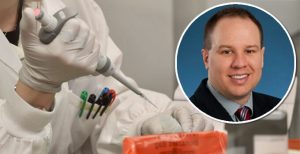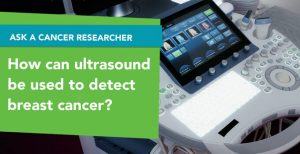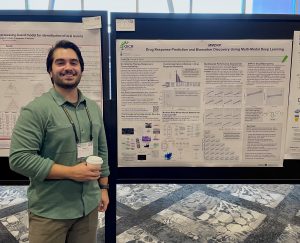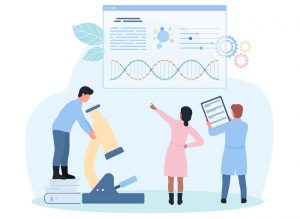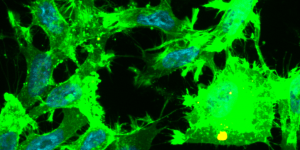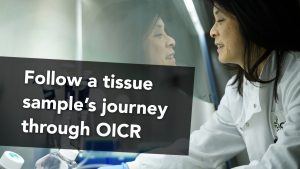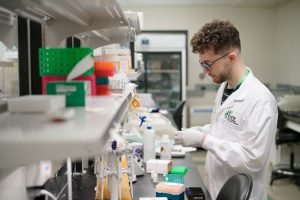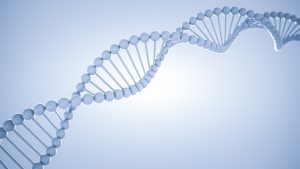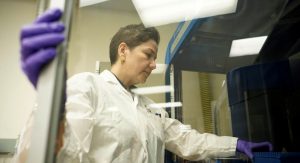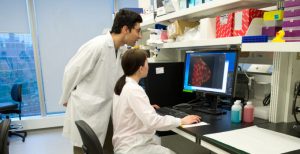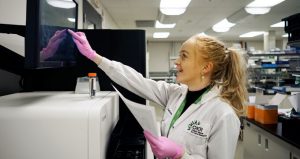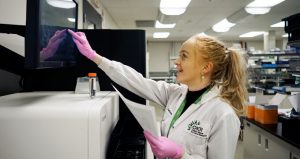Adaptive Oncology (AO) is an important research arm of OICR that focuses on two key goals: Detecting Cancer Early and finding the Right Treatment at the Right Time.
A patient has the best chance of survival when cancers are discovered early. That’s why Detecting Cancer Early is at the core of AO research. From past research, we also know that cancers are a moving target: they change over time. That means a treatment that worked when a cancer was first detected may no longer work as that cancer changes. By understanding how cancers change, we can manage those changes with different therapies over time. We can offer patients the Right Treatment at the Right Time.
The AO team has over 200 researchers across 13 programs and projects working together. Our researchers are creating new tools to find cancers at their earliest stages. Today cancers are largely found by taking images of the body. Our work is improving these images by using new probes to light up cancer cells, and using new equipment to guide biopsies. We are also looking for traces of cancer in blood samples to make early detection even easier. The team is also finding new ways to tell if a cancer is growing slowly or aggressively. Then treatments can be tailored to how aggressive a patient’s cancer is. And we are collecting large amounts of data on cancer cells so we can learn how to treat cancers that have changed.
The AO team is dedicated to working together to find and manage cancer as early as possible, and we are making progress. The work we do will help doctors detect and treat cancers earlier in their patients. More importantly, our work will help more patients manage and live well beyond a cancer diagnosis.
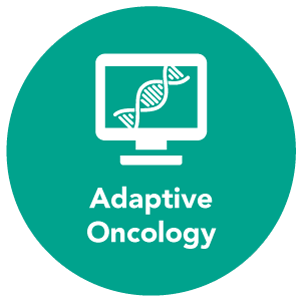
Associate Director
Dr. Michelle Brazas
michelle.brazas@oicr.on.ca
Telephone: 416-673-8502
Mobile: 416-357-6687
The Adaptive Oncology (AO) Initiative develops “adaptive” approaches to cancer management that anticipate how tumours change over the course of time and in response to therapy.
The Initiative, one of OICR’s three key priority research areas, brings together OICR researchers with expertise in genomics, bioinformatics, machine learning, imaging, robotics and histopathology.
Mission
OICR’s AO Initiative seeks to develop knowledge and approaches to monitor cancer over its life cycle in order to enable precise and proactive clinical management.
Our research will create the groundwork for new clinical and diagnostic paradigms that use the knowledge of spatial and temporal heterogeneity to select the right therapy at the right time.
In turn, these paradigms will create opportunities for commercialization via knowledge bases of predictive biomarkers, diagnostic testing services, decision software systems and novel imaging instrumentation.

Computational Biology
Utilizes datasets from multiple sources for the development and application of algorithms for cancer genome analysis, biomarker discovery, cancer pathway discovery, data integration and tumour evolution research. Learn more about Computational Biology
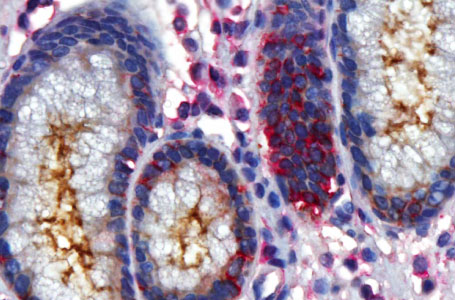
Diagnostic Development
Initiates, disseminates and nurtures expertise in the development of diagnostic assays and supports the rapid implementation of precision medicine. Learn more about Diagnostic Development

Genomics
Provides large-scale, next generation sequencing cancer genomics capabilities to researchers in Ontario and beyond. Learn more about Genomics
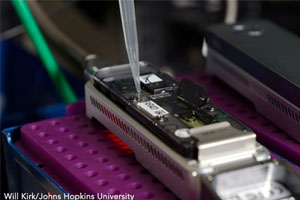
Genome Informatics
Develops new software, databases and other necessary components to store, organize and compute over the large and complex datasets being generated by OICR’s cancer research programs. Learn more about Genome Informatics
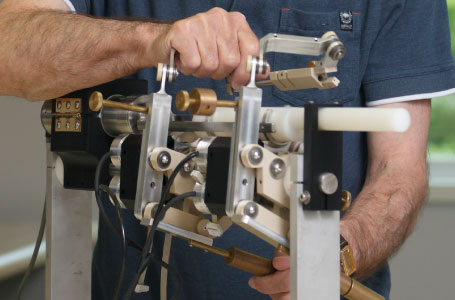
Imaging
Accelerates the translation of research findings and developments of new imaging techniques and probes for cancer into clinical practice. Learn more about Imaging
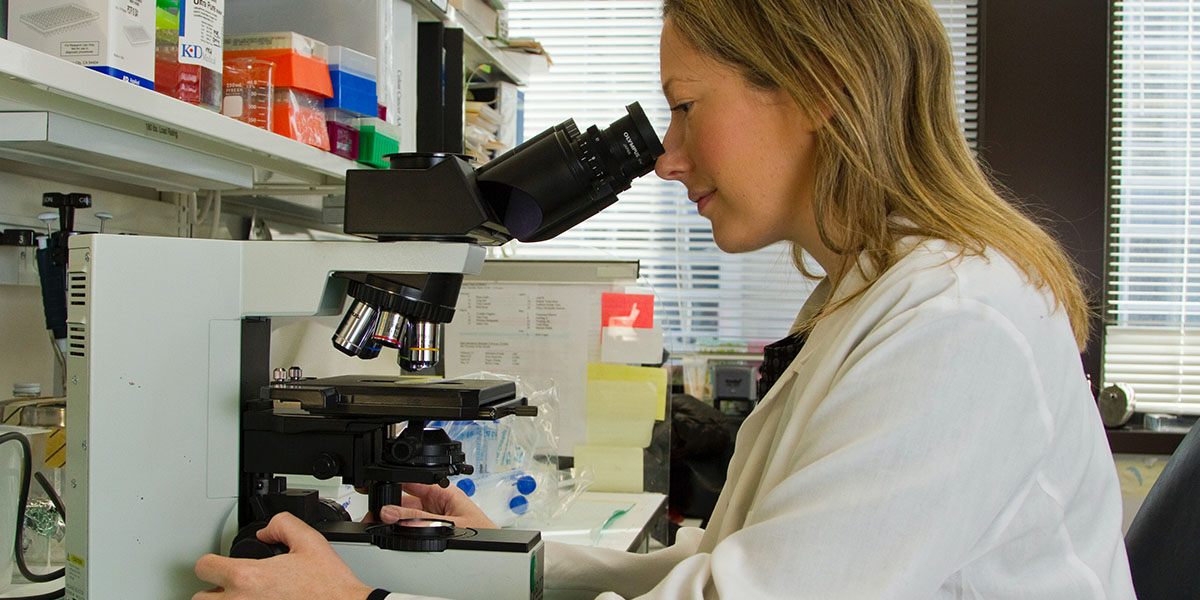
Early Detection of Prostate Cancer
This project aims to provide a method to guide prostate biopsy accurately and efficiently by developing a prostate biopsy-guidance system to be integrated into the prostate-specific PET system and a superior PET imaging tracer.
Learn more about this project
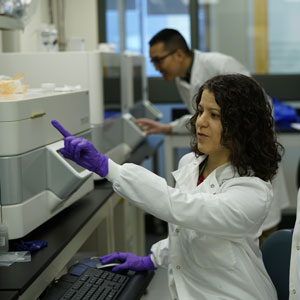
Mapping of Heterogeneity in Early Prostate Cancer
This project aims to determine if MRI-guided targeted biopsy, together with the PRONTO molecular signature test can better detect hidden, high-risk prostate cancer cases compared to the current methods. Learn more about this project

OCTANE 2.0
This project aims to integrate molecular data with imaging data to aid development of computational tools and predictive models for aiding clinical decision making. Learn more about this project
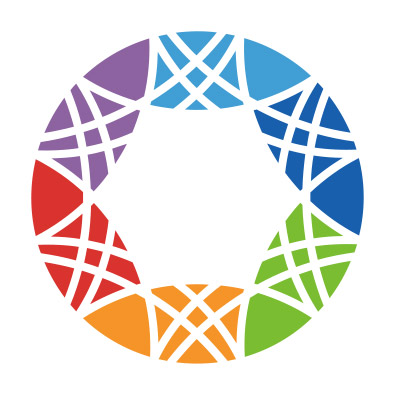
Global Alliance for Genomics and Health
GA4GH was formed to help accelerate the potential of genomic medicine to advance human health.
Learn more about GA4GH

ICGC-ARGO
The ICGC generated comprehensive catalogues of genomic abnormalities in tumours from 50 different cancer types. ICGC AGRO takes the next step in this work by analyzing 100,000 genomes and integrating patient health data to address key clinical and biological questions.
Learn more about ICGC-ARGO

Ontario Tumour Bank
A province-wide biorepository and data bank focused on collection of tumour-related human biospecimens. Learn more about Ontario Tumour Bank
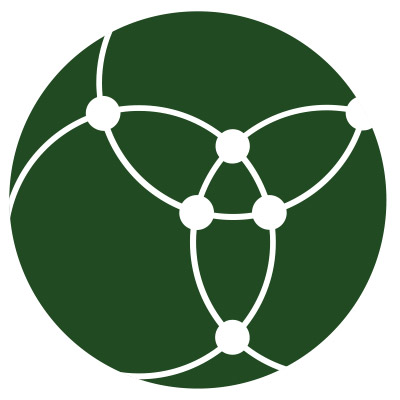
Ontario Molecular Pathology Research Network
A province-wide network of pathologists collaborating to carry out high-quality cancer research with a clear potential for clinical impact. Learn more about Ontario Molecular Pathology Research Network
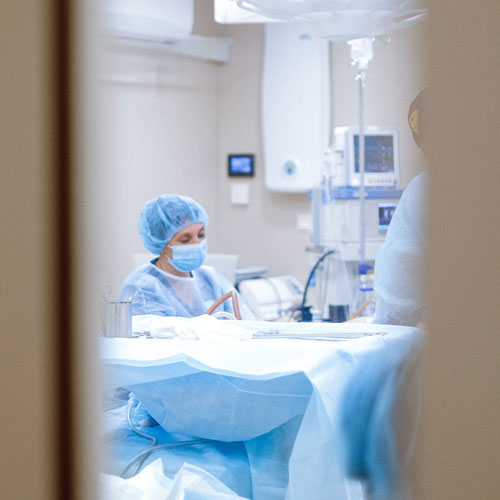
Ontario Hereditary Cancer Research Network
Ontario Hereditary Cancer Research Network is the first registry of its kind in Canada and will be used to understand the biology, prevention, early detection and treatment of hereditary cancers. Learn more about OHCRN


